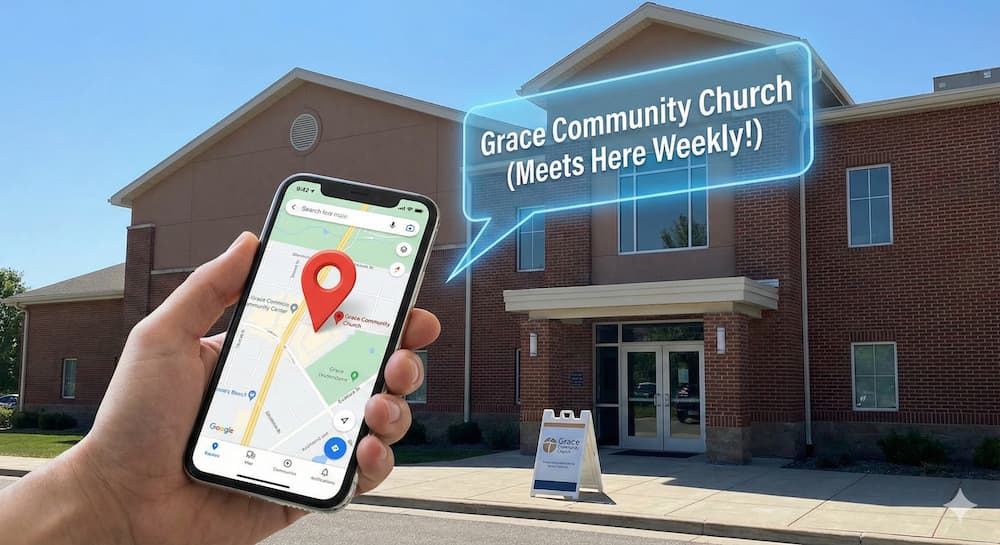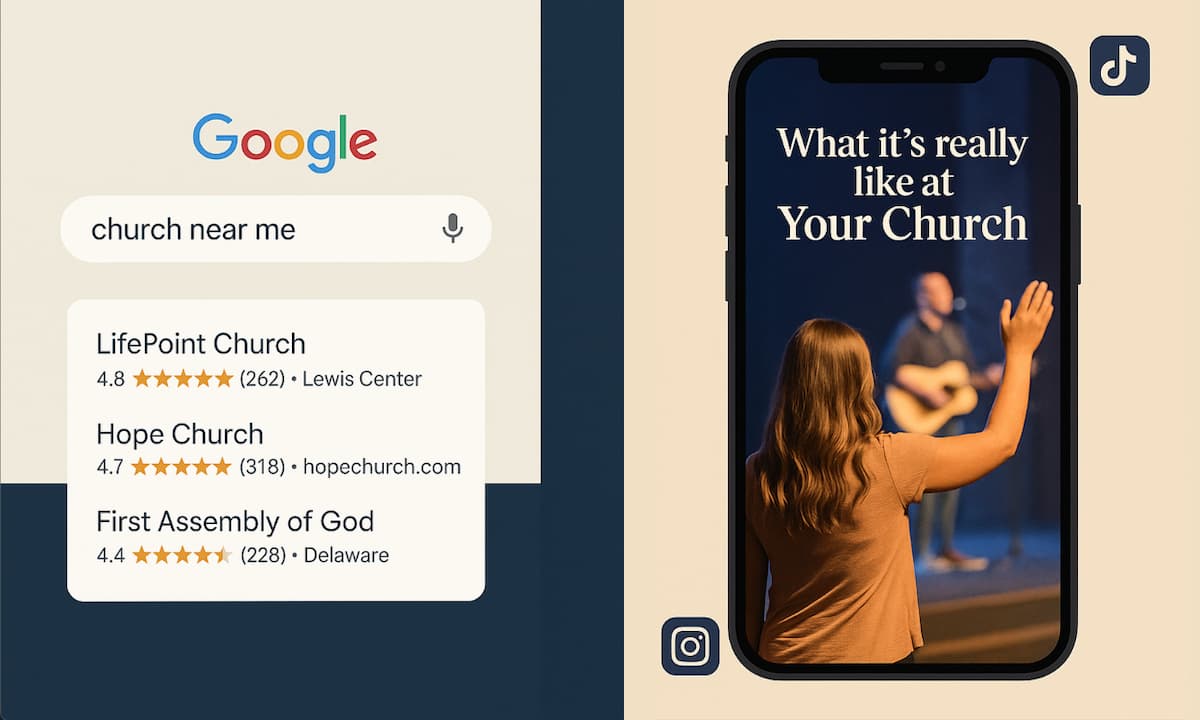Is Church Marketing Biblical?
"Church" and "marketing" don't go together very well for many Christians. But at its core, church marketing is all about bringing people closer to Jesus.

Marketing can allow the church to connect with people and even share the Gospel.
However, the terms “church” and “marketing” don't go very well together for many Christians. They say that church marketing is unethical and leans towards sacrilege.
Their reason for such a perception of church marketing may have stemmed from unfortunate experiences with pushy and dishonorable marketing gimmicks.
But at its core, church marketing is all about bringing people closer to Jesus.
That's why in this article, you'll discover the biblical proofs that connect to the true essence of church marketing.
This will help you answer the question, “Is church marketing biblical?” with a resounding “Yes!”
What is Church Marketing?
Marketing is simply a relationship-building tool.
If you think about it, the Bible is the church's most fundamental marketing tool. The Scriptures bridge man's greatest problem (sin) to God's solution (Jesus).
Plenty of scriptures instruct church leaders on how to invite people to believe in God's promises.
However, the misconception toward church marketing rests on how people define “marketing” in the first place.
Christians, in particular, often associate marketing with greed, deceit, and manipulation. It's easy to believe that when we’re bombarded with spam emails, web trackers, and repetitive advertisements.
These kinds of marketing practices fall outside the spirit of church marketing. But when done right, church marketing can help your church grow ethically.
That's because marketing is about connecting with people, adding value to their lives, and offering them a solution at a large scale, as Christian Ray Flores describes it in this episode of Modern Church Leader Podcast,
“Marketing is not a gimmick; marketing is value communicated at scale,” says Flores. “It’s the ability to have a conversation with many people that communicates value that changes their lives. That’s marketing.”
Similarly, church marketing strives to do the same in the context of growing a church.
So, what exactly is church marketing?
"Church marketing is the process of connecting the people with the church, understanding their problems, and offering Bible-based solutions."
Church leaders must remember that church marketing must ultimately lead Christians not just to the church, but to Jesus Christ.
Here are four main reasons why church marketing can be Biblical:
Church Marketing is about connecting with people
The church needs to communicate with people beyond the pulpit.
It’s difficult to connect with believers if they're outside the church. Even more challenging is connecting with people who have no idea about your church or the Gospel.
People often need nudging from the church before responding to the desired action (i.e. visiting your church).
This is exactly where and when church marketing comes in.
As the best marketers would say, the first step is connecting with your target audience. There's no better way to do it than to dive into their pain points and deepest desires.
The Apostle Paul, for instance, succeeded in his mission because he understood his market.
"Though I am free and belong to no one, I have made myself a slave to everyone to win as many as possible. To the Jews, I became like a Jew to win the Jews. To those under the law, I became like one under the law (though I myself am not under the law) so as to win those under the law. To those not having the law, I became like one not having the law (though I am not free from God's law but am under Christ's law) so as to win those not having the law. To the weak, I became weak to win the weak. I have become all things to all people so that by all possible means, I might save some. I do all this for the sake of the Gospel that I may share in its blessings."
-1 Corinthians 9:19-23
You can be the most knowledgeable person in the room. You can have all the leadership certifications. But you can't serve your target audience well if you don't understand them.
Church Marketing makes use of the appropriate media
If you're looking for inspiration about marketing tools, you need not look further than the Bible!
God's best messengers—the prophets, the kings, and even Jesus—knew how to connect with their audience at a grand scale.
As a church leader, you'll spend a lot of time exploring the best way to make people aware of your offer.
In today's digital age, Jesus' commands suggest that the church must also reach out where the people can be found. By going on the internet and social media and offering a church app, your church can reach new audiences. These marketing practices will help you attract visitors, engage with them, and ultimately lead them to Christ.
Church Marketing adds value to people's lives
Many church leaders cringe at the term "church marketing." That's the prevailing notion among them because they equate marketing to selling.
Unfortunately, many church leaders are still not clear on the true essence of marketing, which is adding value to people's lives.
If your church still thinks that the Sunday worship service remains the only source of value, it's time for you to consider your church's growth strategies.
The Apostle Paul explicitly stated that churches could do much more than preach.
"Let the message of Christ dwell among you richly as you teach and admonish one another with all wisdom through psalms, hymns, and songs from the Spirit, singing to God with gratitude in your hearts. And whatever you do, whether in word or deed, do it all in the name of the Lord Jesus, giving thanks to God the Father through him."
-Colossians 3:16-17
This is precisely how and why thriving churches continue to grow. They invest in church marketing because it adds value to the lives of people even outside their congregations.
Think about the churches that conduct food or clothing drives, hold workshops, and offer free content. They're all part of the church's grander marketing plans.
Are these examples bent on “closing a sale?” Absolutely not!
Instead, these strategies give value to people. They help people fill a gap in their lives or enhance what they already have.
Check out this episode of the Modern Church Leader Podcast: The Role Marketing Plays in Church Growth with Kelvin Co to learn more about marketing and church growth.
Church Marketing seeks to offer the solution
Churches invest in marketing efforts not because they are the answer. The ultimate solution will always be Jesus.
The Bible couldn't be more explicit in stating this truth:
"Jesus answered, "I am the way and the truth and the life. No one comes to the Father except through me."
-John 14:6
Following Jesus is a personal decision and conviction. However, God has designed the church to serve as the community to guide people toward Jesus.
"Be shepherds of God's flock under your care, watching over them—not because you must, but because you are willing, as God wants you to be; not pursuing dishonest gain, but eager to serve."
-1 Peter 5:2
In marketing terms, this means that the church serves as the marketing channel of customer service before and after the sale.
To achieve this, the church must clearly answer this question: Does your church have clear messaging?
Most importantly, as a marketing vessel, the church must offer the best value to people: eternal life with Jesus.
This offer is worthy of communicating and marketing to the entire world!
With this offer in mind, it would always help you to be aware of the ethical side of church marketing. You can discover more practical insights from the Honest Marketing Podcast and this episode with Frank Barry: The Ethics of Selling to Churches.
Over to You
Churches must embrace church marketing, be it in face-to-face encounters or through digital methods. It's the only possible way to reach all corners of the world on a grand scale.
If you're looking for ways to take your church marketing to the next level, check out 2025 Church Marketing Strategies. This guide will help you identify what will work best for your church to connect with people, add value, and offer the solution that is found in Jesus.
Sign Up for Product Updates
Marketing can allow the church to connect with people and even share the Gospel.
However, the terms “church” and “marketing” don't go very well together for many Christians. They say that church marketing is unethical and leans towards sacrilege.
Their reason for such a perception of church marketing may have stemmed from unfortunate experiences with pushy and dishonorable marketing gimmicks.
But at its core, church marketing is all about bringing people closer to Jesus.
That's why in this article, you'll discover the biblical proofs that connect to the true essence of church marketing.
This will help you answer the question, “Is church marketing biblical?” with a resounding “Yes!”
What is Church Marketing?
Marketing is simply a relationship-building tool.
If you think about it, the Bible is the church's most fundamental marketing tool. The Scriptures bridge man's greatest problem (sin) to God's solution (Jesus).
Plenty of scriptures instruct church leaders on how to invite people to believe in God's promises.
However, the misconception toward church marketing rests on how people define “marketing” in the first place.
Christians, in particular, often associate marketing with greed, deceit, and manipulation. It's easy to believe that when we’re bombarded with spam emails, web trackers, and repetitive advertisements.
These kinds of marketing practices fall outside the spirit of church marketing. But when done right, church marketing can help your church grow ethically.
That's because marketing is about connecting with people, adding value to their lives, and offering them a solution at a large scale, as Christian Ray Flores describes it in this episode of Modern Church Leader Podcast,
“Marketing is not a gimmick; marketing is value communicated at scale,” says Flores. “It’s the ability to have a conversation with many people that communicates value that changes their lives. That’s marketing.”
Similarly, church marketing strives to do the same in the context of growing a church.
So, what exactly is church marketing?
"Church marketing is the process of connecting the people with the church, understanding their problems, and offering Bible-based solutions."
Church leaders must remember that church marketing must ultimately lead Christians not just to the church, but to Jesus Christ.
Here are four main reasons why church marketing can be Biblical:
Church Marketing is about connecting with people
The church needs to communicate with people beyond the pulpit.
It’s difficult to connect with believers if they're outside the church. Even more challenging is connecting with people who have no idea about your church or the Gospel.
People often need nudging from the church before responding to the desired action (i.e. visiting your church).
This is exactly where and when church marketing comes in.
As the best marketers would say, the first step is connecting with your target audience. There's no better way to do it than to dive into their pain points and deepest desires.
The Apostle Paul, for instance, succeeded in his mission because he understood his market.
"Though I am free and belong to no one, I have made myself a slave to everyone to win as many as possible. To the Jews, I became like a Jew to win the Jews. To those under the law, I became like one under the law (though I myself am not under the law) so as to win those under the law. To those not having the law, I became like one not having the law (though I am not free from God's law but am under Christ's law) so as to win those not having the law. To the weak, I became weak to win the weak. I have become all things to all people so that by all possible means, I might save some. I do all this for the sake of the Gospel that I may share in its blessings."
-1 Corinthians 9:19-23
You can be the most knowledgeable person in the room. You can have all the leadership certifications. But you can't serve your target audience well if you don't understand them.
Church Marketing makes use of the appropriate media
If you're looking for inspiration about marketing tools, you need not look further than the Bible!
God's best messengers—the prophets, the kings, and even Jesus—knew how to connect with their audience at a grand scale.
As a church leader, you'll spend a lot of time exploring the best way to make people aware of your offer.
In today's digital age, Jesus' commands suggest that the church must also reach out where the people can be found. By going on the internet and social media and offering a church app, your church can reach new audiences. These marketing practices will help you attract visitors, engage with them, and ultimately lead them to Christ.
Church Marketing adds value to people's lives
Many church leaders cringe at the term "church marketing." That's the prevailing notion among them because they equate marketing to selling.
Unfortunately, many church leaders are still not clear on the true essence of marketing, which is adding value to people's lives.
If your church still thinks that the Sunday worship service remains the only source of value, it's time for you to consider your church's growth strategies.
The Apostle Paul explicitly stated that churches could do much more than preach.
"Let the message of Christ dwell among you richly as you teach and admonish one another with all wisdom through psalms, hymns, and songs from the Spirit, singing to God with gratitude in your hearts. And whatever you do, whether in word or deed, do it all in the name of the Lord Jesus, giving thanks to God the Father through him."
-Colossians 3:16-17
This is precisely how and why thriving churches continue to grow. They invest in church marketing because it adds value to the lives of people even outside their congregations.
Think about the churches that conduct food or clothing drives, hold workshops, and offer free content. They're all part of the church's grander marketing plans.
Are these examples bent on “closing a sale?” Absolutely not!
Instead, these strategies give value to people. They help people fill a gap in their lives or enhance what they already have.
Check out this episode of the Modern Church Leader Podcast: The Role Marketing Plays in Church Growth with Kelvin Co to learn more about marketing and church growth.
Church Marketing seeks to offer the solution
Churches invest in marketing efforts not because they are the answer. The ultimate solution will always be Jesus.
The Bible couldn't be more explicit in stating this truth:
"Jesus answered, "I am the way and the truth and the life. No one comes to the Father except through me."
-John 14:6
Following Jesus is a personal decision and conviction. However, God has designed the church to serve as the community to guide people toward Jesus.
"Be shepherds of God's flock under your care, watching over them—not because you must, but because you are willing, as God wants you to be; not pursuing dishonest gain, but eager to serve."
-1 Peter 5:2
In marketing terms, this means that the church serves as the marketing channel of customer service before and after the sale.
To achieve this, the church must clearly answer this question: Does your church have clear messaging?
Most importantly, as a marketing vessel, the church must offer the best value to people: eternal life with Jesus.
This offer is worthy of communicating and marketing to the entire world!
With this offer in mind, it would always help you to be aware of the ethical side of church marketing. You can discover more practical insights from the Honest Marketing Podcast and this episode with Frank Barry: The Ethics of Selling to Churches.
Over to You
Churches must embrace church marketing, be it in face-to-face encounters or through digital methods. It's the only possible way to reach all corners of the world on a grand scale.
If you're looking for ways to take your church marketing to the next level, check out 2025 Church Marketing Strategies. This guide will help you identify what will work best for your church to connect with people, add value, and offer the solution that is found in Jesus.
podcast transcript
Marketing can allow the church to connect with people and even share the Gospel.
However, the terms “church” and “marketing” don't go very well together for many Christians. They say that church marketing is unethical and leans towards sacrilege.
Their reason for such a perception of church marketing may have stemmed from unfortunate experiences with pushy and dishonorable marketing gimmicks.
But at its core, church marketing is all about bringing people closer to Jesus.
That's why in this article, you'll discover the biblical proofs that connect to the true essence of church marketing.
This will help you answer the question, “Is church marketing biblical?” with a resounding “Yes!”
What is Church Marketing?
Marketing is simply a relationship-building tool.
If you think about it, the Bible is the church's most fundamental marketing tool. The Scriptures bridge man's greatest problem (sin) to God's solution (Jesus).
Plenty of scriptures instruct church leaders on how to invite people to believe in God's promises.
However, the misconception toward church marketing rests on how people define “marketing” in the first place.
Christians, in particular, often associate marketing with greed, deceit, and manipulation. It's easy to believe that when we’re bombarded with spam emails, web trackers, and repetitive advertisements.
These kinds of marketing practices fall outside the spirit of church marketing. But when done right, church marketing can help your church grow ethically.
That's because marketing is about connecting with people, adding value to their lives, and offering them a solution at a large scale, as Christian Ray Flores describes it in this episode of Modern Church Leader Podcast,
“Marketing is not a gimmick; marketing is value communicated at scale,” says Flores. “It’s the ability to have a conversation with many people that communicates value that changes their lives. That’s marketing.”
Similarly, church marketing strives to do the same in the context of growing a church.
So, what exactly is church marketing?
"Church marketing is the process of connecting the people with the church, understanding their problems, and offering Bible-based solutions."
Church leaders must remember that church marketing must ultimately lead Christians not just to the church, but to Jesus Christ.
Here are four main reasons why church marketing can be Biblical:
Church Marketing is about connecting with people
The church needs to communicate with people beyond the pulpit.
It’s difficult to connect with believers if they're outside the church. Even more challenging is connecting with people who have no idea about your church or the Gospel.
People often need nudging from the church before responding to the desired action (i.e. visiting your church).
This is exactly where and when church marketing comes in.
As the best marketers would say, the first step is connecting with your target audience. There's no better way to do it than to dive into their pain points and deepest desires.
The Apostle Paul, for instance, succeeded in his mission because he understood his market.
"Though I am free and belong to no one, I have made myself a slave to everyone to win as many as possible. To the Jews, I became like a Jew to win the Jews. To those under the law, I became like one under the law (though I myself am not under the law) so as to win those under the law. To those not having the law, I became like one not having the law (though I am not free from God's law but am under Christ's law) so as to win those not having the law. To the weak, I became weak to win the weak. I have become all things to all people so that by all possible means, I might save some. I do all this for the sake of the Gospel that I may share in its blessings."
-1 Corinthians 9:19-23
You can be the most knowledgeable person in the room. You can have all the leadership certifications. But you can't serve your target audience well if you don't understand them.
Church Marketing makes use of the appropriate media
If you're looking for inspiration about marketing tools, you need not look further than the Bible!
God's best messengers—the prophets, the kings, and even Jesus—knew how to connect with their audience at a grand scale.
As a church leader, you'll spend a lot of time exploring the best way to make people aware of your offer.
In today's digital age, Jesus' commands suggest that the church must also reach out where the people can be found. By going on the internet and social media and offering a church app, your church can reach new audiences. These marketing practices will help you attract visitors, engage with them, and ultimately lead them to Christ.
Church Marketing adds value to people's lives
Many church leaders cringe at the term "church marketing." That's the prevailing notion among them because they equate marketing to selling.
Unfortunately, many church leaders are still not clear on the true essence of marketing, which is adding value to people's lives.
If your church still thinks that the Sunday worship service remains the only source of value, it's time for you to consider your church's growth strategies.
The Apostle Paul explicitly stated that churches could do much more than preach.
"Let the message of Christ dwell among you richly as you teach and admonish one another with all wisdom through psalms, hymns, and songs from the Spirit, singing to God with gratitude in your hearts. And whatever you do, whether in word or deed, do it all in the name of the Lord Jesus, giving thanks to God the Father through him."
-Colossians 3:16-17
This is precisely how and why thriving churches continue to grow. They invest in church marketing because it adds value to the lives of people even outside their congregations.
Think about the churches that conduct food or clothing drives, hold workshops, and offer free content. They're all part of the church's grander marketing plans.
Are these examples bent on “closing a sale?” Absolutely not!
Instead, these strategies give value to people. They help people fill a gap in their lives or enhance what they already have.
Check out this episode of the Modern Church Leader Podcast: The Role Marketing Plays in Church Growth with Kelvin Co to learn more about marketing and church growth.
Church Marketing seeks to offer the solution
Churches invest in marketing efforts not because they are the answer. The ultimate solution will always be Jesus.
The Bible couldn't be more explicit in stating this truth:
"Jesus answered, "I am the way and the truth and the life. No one comes to the Father except through me."
-John 14:6
Following Jesus is a personal decision and conviction. However, God has designed the church to serve as the community to guide people toward Jesus.
"Be shepherds of God's flock under your care, watching over them—not because you must, but because you are willing, as God wants you to be; not pursuing dishonest gain, but eager to serve."
-1 Peter 5:2
In marketing terms, this means that the church serves as the marketing channel of customer service before and after the sale.
To achieve this, the church must clearly answer this question: Does your church have clear messaging?
Most importantly, as a marketing vessel, the church must offer the best value to people: eternal life with Jesus.
This offer is worthy of communicating and marketing to the entire world!
With this offer in mind, it would always help you to be aware of the ethical side of church marketing. You can discover more practical insights from the Honest Marketing Podcast and this episode with Frank Barry: The Ethics of Selling to Churches.
Over to You
Churches must embrace church marketing, be it in face-to-face encounters or through digital methods. It's the only possible way to reach all corners of the world on a grand scale.
If you're looking for ways to take your church marketing to the next level, check out 2025 Church Marketing Strategies. This guide will help you identify what will work best for your church to connect with people, add value, and offer the solution that is found in Jesus.
VIDEO transcript
Marketing can allow the church to connect with people and even share the Gospel.
However, the terms “church” and “marketing” don't go very well together for many Christians. They say that church marketing is unethical and leans towards sacrilege.
Their reason for such a perception of church marketing may have stemmed from unfortunate experiences with pushy and dishonorable marketing gimmicks.
But at its core, church marketing is all about bringing people closer to Jesus.
That's why in this article, you'll discover the biblical proofs that connect to the true essence of church marketing.
This will help you answer the question, “Is church marketing biblical?” with a resounding “Yes!”
What is Church Marketing?
Marketing is simply a relationship-building tool.
If you think about it, the Bible is the church's most fundamental marketing tool. The Scriptures bridge man's greatest problem (sin) to God's solution (Jesus).
Plenty of scriptures instruct church leaders on how to invite people to believe in God's promises.
However, the misconception toward church marketing rests on how people define “marketing” in the first place.
Christians, in particular, often associate marketing with greed, deceit, and manipulation. It's easy to believe that when we’re bombarded with spam emails, web trackers, and repetitive advertisements.
These kinds of marketing practices fall outside the spirit of church marketing. But when done right, church marketing can help your church grow ethically.
That's because marketing is about connecting with people, adding value to their lives, and offering them a solution at a large scale, as Christian Ray Flores describes it in this episode of Modern Church Leader Podcast,
“Marketing is not a gimmick; marketing is value communicated at scale,” says Flores. “It’s the ability to have a conversation with many people that communicates value that changes their lives. That’s marketing.”
Similarly, church marketing strives to do the same in the context of growing a church.
So, what exactly is church marketing?
"Church marketing is the process of connecting the people with the church, understanding their problems, and offering Bible-based solutions."
Church leaders must remember that church marketing must ultimately lead Christians not just to the church, but to Jesus Christ.
Here are four main reasons why church marketing can be Biblical:
Church Marketing is about connecting with people
The church needs to communicate with people beyond the pulpit.
It’s difficult to connect with believers if they're outside the church. Even more challenging is connecting with people who have no idea about your church or the Gospel.
People often need nudging from the church before responding to the desired action (i.e. visiting your church).
This is exactly where and when church marketing comes in.
As the best marketers would say, the first step is connecting with your target audience. There's no better way to do it than to dive into their pain points and deepest desires.
The Apostle Paul, for instance, succeeded in his mission because he understood his market.
"Though I am free and belong to no one, I have made myself a slave to everyone to win as many as possible. To the Jews, I became like a Jew to win the Jews. To those under the law, I became like one under the law (though I myself am not under the law) so as to win those under the law. To those not having the law, I became like one not having the law (though I am not free from God's law but am under Christ's law) so as to win those not having the law. To the weak, I became weak to win the weak. I have become all things to all people so that by all possible means, I might save some. I do all this for the sake of the Gospel that I may share in its blessings."
-1 Corinthians 9:19-23
You can be the most knowledgeable person in the room. You can have all the leadership certifications. But you can't serve your target audience well if you don't understand them.
Church Marketing makes use of the appropriate media
If you're looking for inspiration about marketing tools, you need not look further than the Bible!
God's best messengers—the prophets, the kings, and even Jesus—knew how to connect with their audience at a grand scale.
As a church leader, you'll spend a lot of time exploring the best way to make people aware of your offer.
In today's digital age, Jesus' commands suggest that the church must also reach out where the people can be found. By going on the internet and social media and offering a church app, your church can reach new audiences. These marketing practices will help you attract visitors, engage with them, and ultimately lead them to Christ.
Church Marketing adds value to people's lives
Many church leaders cringe at the term "church marketing." That's the prevailing notion among them because they equate marketing to selling.
Unfortunately, many church leaders are still not clear on the true essence of marketing, which is adding value to people's lives.
If your church still thinks that the Sunday worship service remains the only source of value, it's time for you to consider your church's growth strategies.
The Apostle Paul explicitly stated that churches could do much more than preach.
"Let the message of Christ dwell among you richly as you teach and admonish one another with all wisdom through psalms, hymns, and songs from the Spirit, singing to God with gratitude in your hearts. And whatever you do, whether in word or deed, do it all in the name of the Lord Jesus, giving thanks to God the Father through him."
-Colossians 3:16-17
This is precisely how and why thriving churches continue to grow. They invest in church marketing because it adds value to the lives of people even outside their congregations.
Think about the churches that conduct food or clothing drives, hold workshops, and offer free content. They're all part of the church's grander marketing plans.
Are these examples bent on “closing a sale?” Absolutely not!
Instead, these strategies give value to people. They help people fill a gap in their lives or enhance what they already have.
Check out this episode of the Modern Church Leader Podcast: The Role Marketing Plays in Church Growth with Kelvin Co to learn more about marketing and church growth.
Church Marketing seeks to offer the solution
Churches invest in marketing efforts not because they are the answer. The ultimate solution will always be Jesus.
The Bible couldn't be more explicit in stating this truth:
"Jesus answered, "I am the way and the truth and the life. No one comes to the Father except through me."
-John 14:6
Following Jesus is a personal decision and conviction. However, God has designed the church to serve as the community to guide people toward Jesus.
"Be shepherds of God's flock under your care, watching over them—not because you must, but because you are willing, as God wants you to be; not pursuing dishonest gain, but eager to serve."
-1 Peter 5:2
In marketing terms, this means that the church serves as the marketing channel of customer service before and after the sale.
To achieve this, the church must clearly answer this question: Does your church have clear messaging?
Most importantly, as a marketing vessel, the church must offer the best value to people: eternal life with Jesus.
This offer is worthy of communicating and marketing to the entire world!
With this offer in mind, it would always help you to be aware of the ethical side of church marketing. You can discover more practical insights from the Honest Marketing Podcast and this episode with Frank Barry: The Ethics of Selling to Churches.
Over to You
Churches must embrace church marketing, be it in face-to-face encounters or through digital methods. It's the only possible way to reach all corners of the world on a grand scale.
If you're looking for ways to take your church marketing to the next level, check out 2025 Church Marketing Strategies. This guide will help you identify what will work best for your church to connect with people, add value, and offer the solution that is found in Jesus.




























